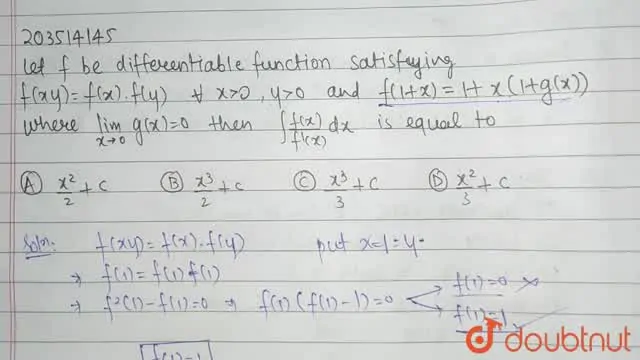Let f be a differentiable function satisfying f(xy)=f(x).f(y).∀x>0,y>0 and f(1+x)=1+x{1+g(x)}, where limx→0g(x)=0 then ∫f(x)f'(x)dx is equal to
x22+C
x32+C
x33+C
x23+C
The correct Answer is:A
Put x=y=1, we get f(1)=f2(1)⇒f(1)=1[∵f(1)≠0]
Differentiating with respect to x partially, we get
yf'(xy)=f(y)f'(x)
Putting x=1⇒yf'(y)=f(y)f'(1)⇒f(y)f'(y)=yf'(1)
Now, ∫f(x)f'(x)dx=∫xf'(1)dx=1f'(1)(x22+c)
f'(1)=limh→0f(1+h)−f(1)h
=limh→01+h+hg(h)−1h=limh→01+g(h)=1
∵limh→0g(h)=0∴∫f(x)f'(x)dx=x22+C
Similar Questions
Let f(xy)=f(xy)f(y)for allx>0,y>0andf(1+x)=1+x[1+g(x)],where limx→0,whereg(x),then ∫f(x)f'(x)dxis
View SolutionLet f be differentiable function satisfying f(xy)=f(x)−f(y)for allx,y>0. If f'(1) = 1, then f(x) is
View SolutionLet f(x) be a differentiable function satisfying f(y)f(xy)=f(x) ∀, x,y∈R, y≠0 and f(1)≠0, f'(1)=3 then
View SolutionLet f(x) be a function satisfying f(x+y)=f(x)f(y) for all x,y∈R and f(x)=1+xg(x) where limx→0g(x)=1. Then f'(x) is equal to
View SolutionLet f be a differentiable function satisfying f(x+2y)=2yf(x)+xf(y)−3xy+1 ∀x,y in R such that f'(0)=1 ,then value of f(8) is equal
View SolutionLet f (x) be a function satisfying f(x+y)=f(x)f(y) for all x,y∈R and f(x)=1+xg(x) where limx→0g(x)=1 then f'(x) is equal to
View SolutionIf f is a differentiable function satisfying 2f(x)=f(xy)+f(xy),∀x,y∈R+,f(1)=0 and f'(1)=1ln6, then f(7776)=
View SolutionLet f(x) be a continuous and differentiable function satisfying f(x+y)=f(x)f(y)∀x,y∈R if f(x) an be expressed as f(x)=1+xP(x)+x2Q(x) where limx→0P(x)=aandlimx→0Q(x)=b, then f'(x) is equal to :
View SolutionLet f be a function such that f(xy)=f(x).f(y),∀y∈RandR(1+x)=1+x(1+g(x)). where limx→0g(x)=0. Find the value of ∫21f(x)f'(x).11+x2dx
View SolutionLet f(x) be a differentiable function which satisfies the equation f(xy)=f(x)+f(y) for all x>0,y>0 then f'(x) equals to
View Solution


